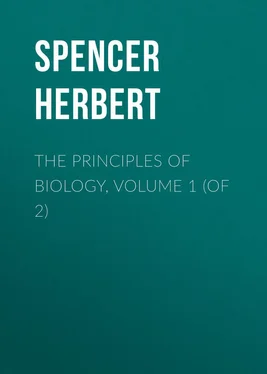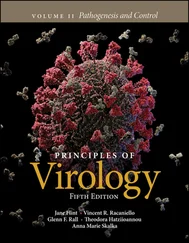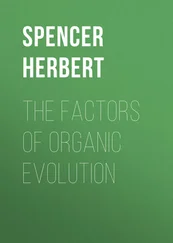Herbert Spencer - The Principles of Biology, Volume 1 (of 2)
Здесь есть возможность читать онлайн «Herbert Spencer - The Principles of Biology, Volume 1 (of 2)» — ознакомительный отрывок электронной книги совершенно бесплатно, а после прочтения отрывка купить полную версию. В некоторых случаях можно слушать аудио, скачать через торрент в формате fb2 и присутствует краткое содержание. Жанр: Философия, foreign_antique, foreign_prose, на английском языке. Описание произведения, (предисловие) а так же отзывы посетителей доступны на портале библиотеки ЛибКат.
- Название:The Principles of Biology, Volume 1 (of 2)
- Автор:
- Жанр:
- Год:неизвестен
- ISBN:нет данных
- Рейтинг книги:3 / 5. Голосов: 1
-
Избранное:Добавить в избранное
- Отзывы:
-
Ваша оценка:
- 60
- 1
- 2
- 3
- 4
- 5
The Principles of Biology, Volume 1 (of 2): краткое содержание, описание и аннотация
Предлагаем к чтению аннотацию, описание, краткое содержание или предисловие (зависит от того, что написал сам автор книги «The Principles of Biology, Volume 1 (of 2)»). Если вы не нашли необходимую информацию о книге — напишите в комментариях, мы постараемся отыскать её.
The Principles of Biology, Volume 1 (of 2) — читать онлайн ознакомительный отрывок
Ниже представлен текст книги, разбитый по страницам. Система сохранения места последней прочитанной страницы, позволяет с удобством читать онлайн бесплатно книгу «The Principles of Biology, Volume 1 (of 2)», без необходимости каждый раз заново искать на чём Вы остановились. Поставьте закладку, и сможете в любой момент перейти на страницу, на которой закончили чтение.
Интервал:
Закладка:
Besides these general, and not conspicuous, electrical phenomena common to all organisms, vegetal as well as animal, there are certain special and strongly marked ones. I refer, of course, to those which have made the Torpedo and the Gymnotus objects of so much interest. In these creatures we have a genesis of electricity which is not incidental on the performance of their different functions by the different organs; but one which is itself a function, having an organ appropriate to it. The character of this organ in both these fishes, and its largely-developed connexions with the nervous centres, have raised in some minds the suspicion that in it there takes place a transformation of what we call nerve-force into the force known as electricity. Perhaps, however, the true interpretation may rather be that by nervous stimulation there is set up in these animal-batteries that particular transformation of molecular motion which it is their function to produce.
But whether general or special, and in whatever manner produced, these evolutions of electricity are among the reactions of organic matter called forth by the actions to which it is subject. Though these re-actions are not direct, but seem to be remote consequences of changes wrought by external agencies on the organism, they are yet incidents in that general re-distribution of motion which these external agencies initiate; and as such must here be noticed.
§ 21. To these known modes of motion, has next to be added an unknown one. Heat, Light, and Electricity are emitted by inorganic matter when undergoing changes, as well as by organic matter. But there is manifested in some classes of living bodies a kind of force which we cannot identify with any of the forces manifested by bodies that are not alive, – a force which is thus unknown, in the sense that it cannot be assimilated to any otherwise-recognized class. I allude to what is called nerve-force.
This is habitually generated in all animals, save the lowest, by incident forces of every kind. The gentle and violent mechanical contacts, which in ourselves produce sensations of touch and pressure – the additions and abstractions of molecular vibration, which in ourselves produce sensations of heat and cold, produce in all creatures that have nervous systems, certain nervous disturbances: disturbances which, as in ourselves, are either communicated to the chief nervous centre, and there arouse consciousness, or else result in mere physical processes set going elsewhere in the organism. In special parts distinguished as organs of sense, other external actions bring about other nervous re-actions, that show themselves either as special sensations or as excitements which, without the intermediation of distinct consciousness, beget actions in muscles or other organs. Besides neural discharges following the direct incidence of external forces, others are ever being caused by the incidence of forces which, though originally external, have become internal by absorption into the organism of the agents exerting them. For thus may be classed those neural discharges which result from modifications of the tissues wrought by substances carried to them in the blood. That the unceasing change of matter which oxygen and other agents produce throughout the system, is accompanied by production of nerve-force, is shown by various facts; – by the fact that nerve-force is no longer generated if oxygen be withheld or the blood prevented from circulating; by the fact that when the chemical transformation is diminished, as during sleep with its slow respiration and circulation, there is a diminution in the quantity of nerve-force; by the fact that an excessive expenditure of nerve-force involves excessive respiration and circulation, and excessive waste of tissue. To these proofs that nerve-force is evolved in greater or less quantity, according as the conditions to rapid molecular change throughout the body are well or ill fulfilled, may be added proofs that certain special molecular actions are the causes of these special re-actions. The effects of the vegeto-alkalies put beyond doubt the inference that the overthrow of molecular equilibrium by chemical affinity, when it occurs in certain parts, causes excitement in the nerves proceeding from those parts. Indeed, looked at from this point of view, the two classes of nervous changes – the one initiated from without and the other from within – are seen to merge into one class. Both of them may be traced to metamorphosis of tissue. The sensations of touch and pressure are doubtless consequent on accelerated changes of matter, produced by mechanical disturbance of the mingled fluids and solids composing the parts affected. There is abundant evidence that the gustatory sensation is due to the chemical actions set up by particles which find their way through the membrane covering the nerves of taste; for, as Prof. Graham points out, sapid substances belong to the class of crystalloids, which are able rapidly to permeate animal tissue, while the colloids which cannot pass through animal tissue are insipid. Similarly with the sense of smell. Substances which excite this sense are necessarily more or less volatile; and their volatility being the result of their molecular mobility, implies that they have, in a high degree, the power of getting at the olfactory nerves by penetrating their mucous investment. Again, the facts which photography has familiarized us with, show that those nervous impressions called colours, are primarily due to certain changes wrought by light in the substance of the retina. And though, in the case of hearing, we cannot so clearly trace the connexion of cause and effect, yet as we see that the auditory apparatus is one fitted to intensify those vibrations constituting sound, and to convey them to a receptacle containing liquid in which nerves are immersed, it can scarcely be doubted that the sensation of sound proximately results from molecular re-arrangements caused in these nerves by the vibrations of the liquid: knowing, as we do, that the re-arrangement of molecules is in all cases aided by agitation. Perhaps, however, the best proof that nerve-force, whether peripheral or central in origin, results from chemical change, lies in the fact that most of the chemical agents which powerfully affect the nervous system, affect it whether applied at the centre or at the periphery. Various mineral acids are tonics – the stronger ones being usually the stronger tonics; and this which we call their acidity implies a power in them of acting on the nerves of taste, while the tingling or pain following their absorption through the skin, implies that the nerves of the skin are acted on by them. Similarly with certain vegeto-alkalies which are peculiarly bitter. By their bitterness these show that they affect the extremities of the nerves, while, by their tonic properties, they show that they affect the nervous centres: the most intensely bitter among them, strychnia, being the most powerful nervous stimulant. 11However true it may be that this relation is not a regular one, since opium, hashish, and some other drugs, which work marked effects on the brain, are not remarkably sapid – however true it may be that there are relations between particular substances and particular parts of the nervous system; yet such instances do but qualify, without negativing, the general proposition. The truth of this proposition can scarcely be doubted when, to the facts above given, is added the fact that various condiments and aromatic drugs act as nervous stimulants; and the fact that anæsthetics, besides the general effects they produce when inhaled or swallowed, produce local effects of like kind – first stimulant and then sedative – when absorbed through the skin; and the fact that ammonia, which in consequence of its extreme molecular mobility so quickly and so violently excites the nerves beneath the skin, as well as those of the tongue and the nose, is a rapidly-acting stimulant when taken internally.
Читать дальшеИнтервал:
Закладка:
Похожие книги на «The Principles of Biology, Volume 1 (of 2)»
Представляем Вашему вниманию похожие книги на «The Principles of Biology, Volume 1 (of 2)» списком для выбора. Мы отобрали схожую по названию и смыслу литературу в надежде предоставить читателям больше вариантов отыскать новые, интересные, ещё непрочитанные произведения.
Обсуждение, отзывы о книге «The Principles of Biology, Volume 1 (of 2)» и просто собственные мнения читателей. Оставьте ваши комментарии, напишите, что Вы думаете о произведении, его смысле или главных героях. Укажите что конкретно понравилось, а что нет, и почему Вы так считаете.












